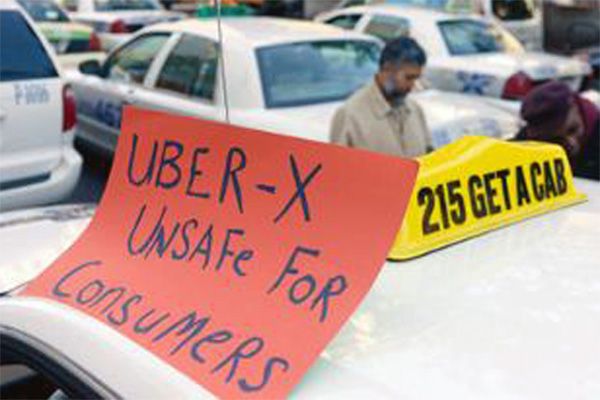 Despite Uber facing a ban across many states, including Karnataka and Maharashtra, for Lingaraju, a driver employed by the company in Bengaluru, it is business as usual.
Despite Uber facing a ban across many states, including Karnataka and Maharashtra, for Lingaraju, a driver employed by the company in Bengaluru, it is business as usual.
The ban was announced after one of drivers running a Uber taxi allegedly raping a 27-year-old finance executive in the national capital earlier this month.
“We have been told the company will be registered in Karnataka by next week,” he says. But till the ban is revoked, Uber’s operations are illegal.
This, however, isn’t stopping Lingaraju or Uber. Or, for that matter, the company’s peers such as OlaCabs and TaxiForSure, whose services have also been banned.
That law-enforcement agencies might have no way to pull the plug on these companies isn’t surprising.
It took a rape for the authorities to be aware of the presence and operations of these companies which, as is being alleged now, are illegal.
Satish Mathur, special commissioner of the Delhi Transport Department, told The Economic Times the department came to know about the Uber only after the rape.
“We had to log on to the internet to know how the company worked,” he said. This is despite the fact that a million people across the country are ‘active’ users of such services.
The recent rape has brought to the fore the tussle between technology businesses such as Uber and authorities. Noshir Kaka, managing director of McKinsey & Company India, says technology moves at three-five times the speed of regulations and everybody is “running” to keep up.
“Technology is being pulled by the consumer - they start it and then the management and the regulations follow,” he says.
India’s struggle with e-commerce companies such as Amazon underlines Kaka’s point. The US-based firm is facing probe by the Enforcement Directorate (ED) and by tax authorities.
The company says if it agrees to the tax department’s demand of paying value-added tax on goods sold through its platform, it will run foul of the country’s e-commerce regulations, inviting the ire of the ED. This puts Amazon in a catch 22 situation.
At a recent press meeting, officials of India’s information technology sector said though Uber claimed to be a technology company, a solution to the “Uber problem” wasn’t something they should be worrying about.
“Transport authorities should answer those questions,” said a senior official. A large part of the problem stems from the fact that rules in India do not favour the business models of most new-age companies, be it an online marketplace or an aggregator.
In both the cases, while companies are customising their models to align with regulations, the government is tweaking laws to factor in the new ways of doing business.
Nasscom president R Chandrashekhar says “we need to ensure regulatory systems are able to respond quickly to the situation. It is possible that there will be a phase lag, but it should not be too long”.
Also, overregulation had to be avoided, added Chandrashekhar, former telecom and information technology secretary to the Centre.
The government is learnt to have set up a committee, with representatives from the finance and commerce ministries, to devise a clear mechanism for the e-commerce sector.
Similarly, the proposed Road Transport & Safety Bill, expected to be cleared by the government soon, is incorporating clauses to bring aggregators such as Uber under the ambit of regulation, a first.
More, within a month of the rape, the Delhi government has started making specific guidelines for the operations of app-based taxi operators.
These will include mandatory installation of Global Positioning System devices, providing a database of their drivers to the police, and securing a permit for the national capital region from authorities.
Anu Madgavkar, senior fellow at the McKinsey Global Institute, says regulations could be both positive and negative.
“Many a times, it is the lack of regulations that leads to white spaces - the very opportunities used by companies,” she said.
Striking a note of caution, she adds, before shaping new policies, regulators should understand the risks as well as opportunities in new-age businesses.
Following an advisory by the Centre, the Karnataka government asked taxi companies to register with the state’s transport authority, as well as with the 25 existing rules such as mandatory uniforms for drivers.
Other rules include a mandatory luggage carrier, to be painted yellow, with a signboard saying “City Taxi”. While some of the norms might go a long way in enhancing safety, others seem archaic and stifling.
“The government and the companies that are a part of the new-age economy should sit together and come up with a regulatory framework that is designed around safety and ease of doing business in an environment of mutual trust,” says Raghunandan G, chief executive of TaxiForSure.










